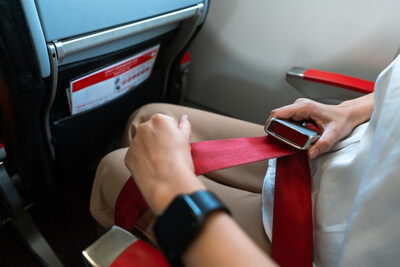Artemis Aerospace explores the boom in budget airlines
WISTON, England, Jan. 23, 2025 /PRNewswire/ -- The boom in budget airlines has been an impressive aviation success story. Artemis Aerospace delves into the budget world to find out why they became so popular, and what they might start charging you for next . . .
The enormous expansion of the aviation sector over the last thirty years owes a great deal to budget airlines, or low-cost carriers (LCCs), and there's nothing to indicate that their success is in any way on the wane.
A budget airline is one which operates on minimising operating costs, the diametric opposite of the larger commercial airlines which try to attract passengers based on the ultimate customer experience. A feature of the budget experience means that although passengers save on the price of a ticket, they often have to spend more on 'extras' such as hand baggage, which would be included in the price elsewhere.
According to the International Civil Aviation Organization (ICAO), in 2015 preliminary figures showed that 'the global aviation network carried 3.5 billion passengers on 34 million scheduled departures. By 2030, current projections suggest these numbers will nearly double.' The huge expansion of LCCs has been a significant factor in this rise. They fill the consumer's requirement for affordable travel in a market dominated by carriers which can be seen as prohibitively expensive.
The birth of the LCC phenomenon is usually acknowledged to be the business model of Southwest Airlines, founded in 1966 and based in the USA in Dallas, Texas. Its planned strategy initially was to fly only within the state of Texas, thus claiming exemption from regulation by the Civil Aeronautics Board and consequently undercutting the prices of other airlines. Still an LCC carrier today, it flies to over 100 destinations in the USA, Central America and the Caribbean, but has resisted expanding to cover international routes. It is still the third largest domestic airline in America.
In the 1970s Freddie Laker's UK budget airline took off, offering 30% discounts to tour operators to charter its aircraft during the winter months when demand for flying was lower, keeping the fleet flying throughout the year. Laker also introduced techniques to reduce the weight of the planes, allowing them to fly further before refuelling was needed. These included dropping the usual baggage allowance limit of 20kg to 18kg, and not filling the planes to capacity.
The 1990s saw the biggest rise in LCC airlines with the deregulation of the aviation industry in Europe in 1997. This facilitated the entry to the market of household names such as Easyjet, which flies to over 34 countries, and Ryanair which flies to over 40.
How do LCCs manage to retain profitability with such low prices? Strategies vary from airline to airline. The type of aircraft is a factor, with many choosing a single type of aircraft with the minimal amount of equipment. This reduces the weight which in turn helps with fuel efficiency, and less equipment means fewer parts requiring maintenance. It also means fewer training costs as pilots, cabin crew and ground crew will only need to train on one model. LCCs tend to fly from smaller airports at off-peak times, reducing congestion and delays, with cheaper airport fees and parking charges which can then be passed on to the consumer.
LCCs also tend to operate a point-to-point model for their flight routes instead of the hub-and-spoke model favoured by the non-budget airlines. They focus on flying short haul, with direct travel between two cities rather than routing flights via central hub airports. This also makes pricing simpler. Tickets are booked online which reduces expenditure on admin. Many staff double up on jobs, such as cabin crew checking tickets rather than having separate staff. There is usually a simplified management structure and decision-making process.
The most well-known price reduction strategy is to offer a cheap flight, but charge extra for options like priority boarding, hand luggage and car rental services. LCCs have little or no premium seating or reserved seating, and don't usually operate a customer loyalty scheme. Any food and drink consumed will be charged as an extra, if indeed it's provided at all. Each LCC will have a variation on these themes.
The success of the budget approach has galvanised some of the major airlines to offer a basic economy package in the hope of luring customers back. The aftermath of the COVID-19 pandemic also changed consumer flight patterns, with a dip in short haul business travel due to many meetings taking place online, and LCCs picking up business travellers who are no longer prepared to pay premium rates for short flights.
A recent analysis of multiple passenger surveys by Boeing found that the majority of respondents were planning to increase the number of holiday flights they took, and projections for the future look promising. According to CAPA, the centre for aviation, Europe's top dozen LCCs carried 112 million more passengers in 2023 than the top 12 non-LCCs. It's an impressive success story, although passengers continue to wonder what extras will be charged for next. In 2009 the news that Ryanair was considering charging to use the onboard loo caused outrage. It wasn't implemented at the time but who knows what the future may hold in the budget airline world . . .
Artemis Aerospace offers an innovative approach to component solutions for the aviation sector. Established in 1999, the company has earned a reputation for outstanding customer service by solving problems and providing a range of realistic options that offer customers the flexibility and freedom to choose a solution that suits their timescale and budget. Its services include component supplies, component repairs, lessor support, flight simulation hardware support, consignment stock management and global aircraft logistics.
With decades of expertise in global aviation logistics, the expert team works with trusted MROs, OEMs, and aftermarket suppliers around the world to offer 24/7 support to its global customer base.
Website: www.artemisaerospace.com
Photo - https://mma.prnewswire.com/media/2604695/Artemis_Aerospace.jpg
![]() View original content to download multimedia:https://www.prnewswire.com/news-releases/artemis-aerospace-explores-the-boom-in-budget-airlines-302358551.html
View original content to download multimedia:https://www.prnewswire.com/news-releases/artemis-aerospace-explores-the-boom-in-budget-airlines-302358551.html
SOURCE Artemis Aerospace


